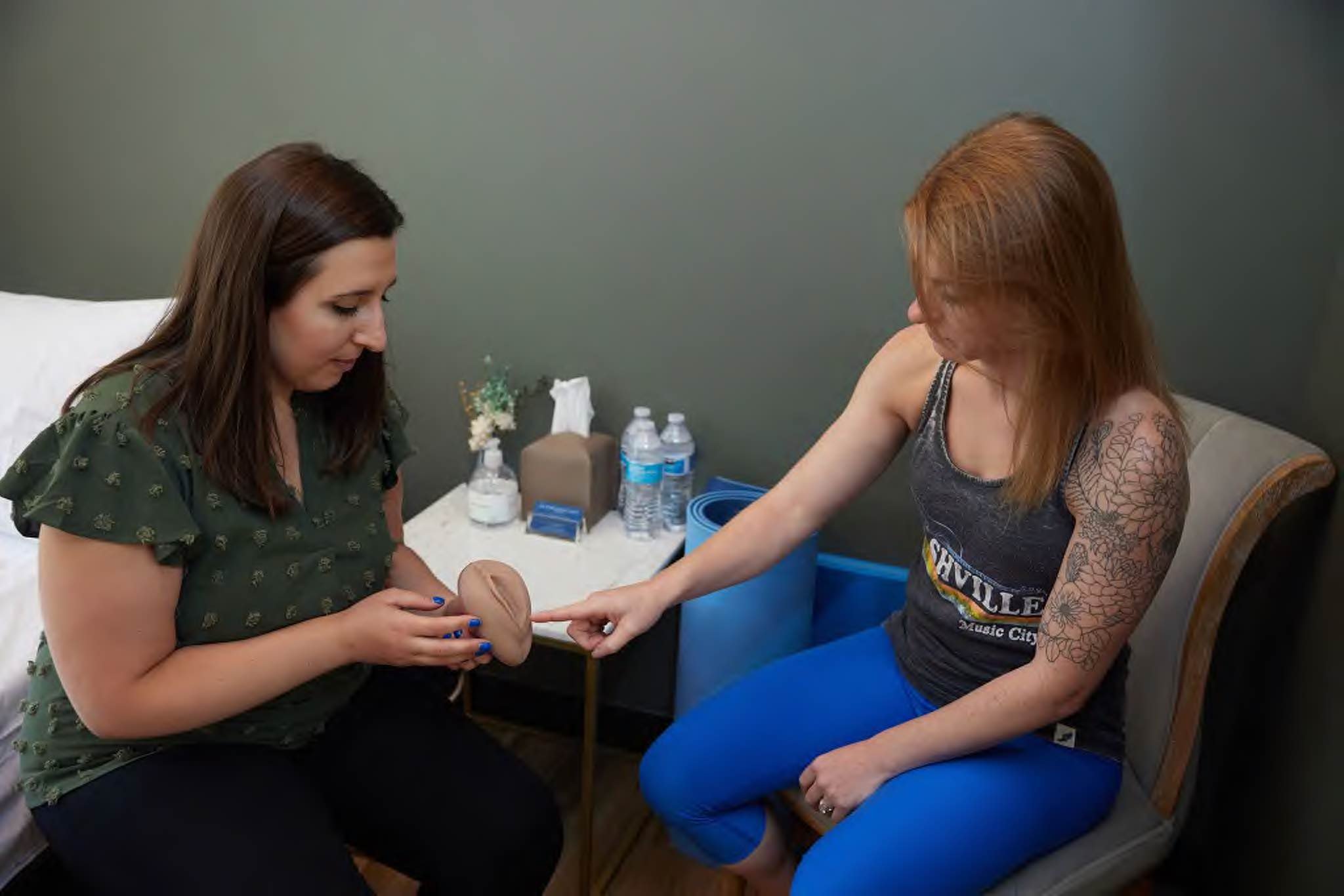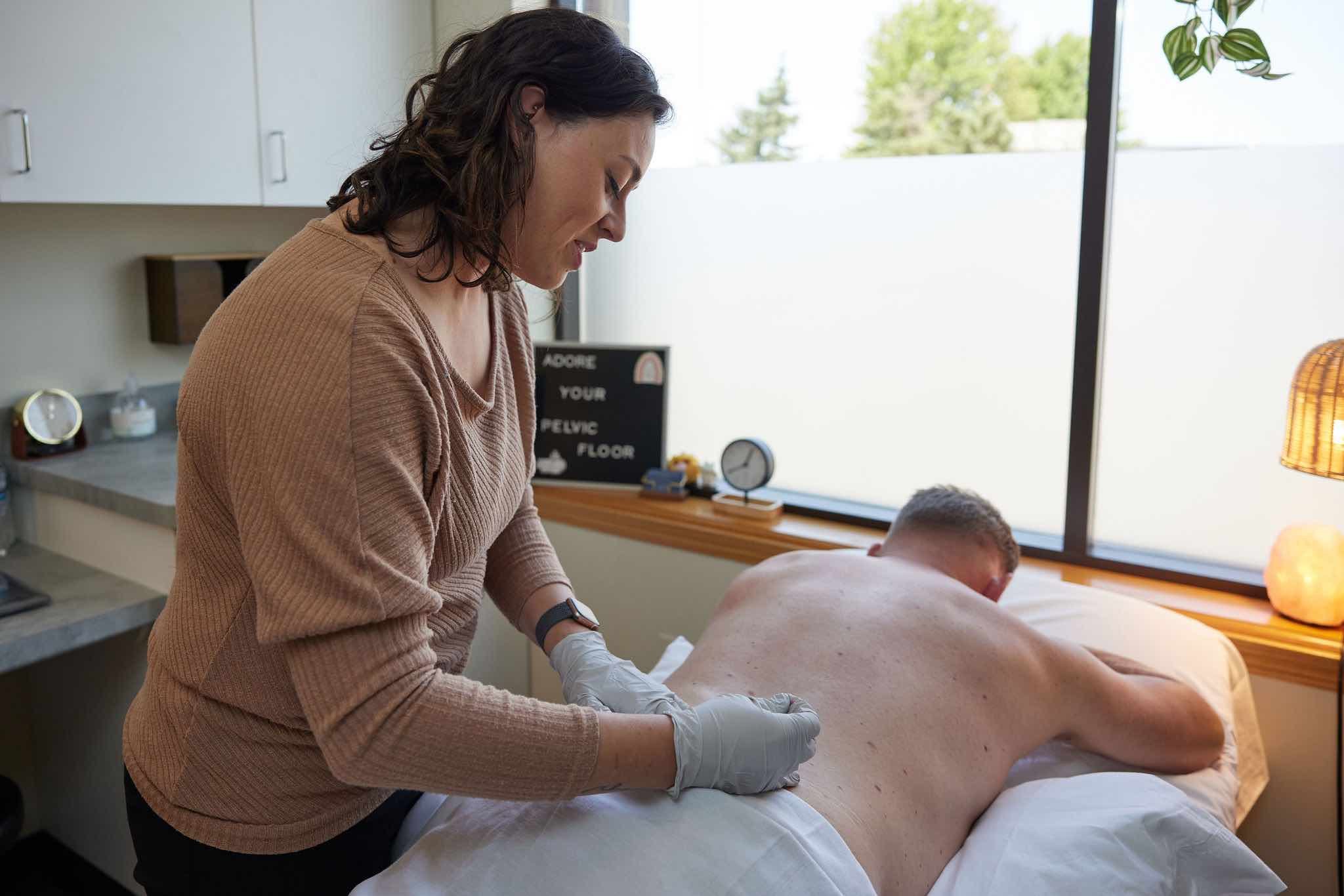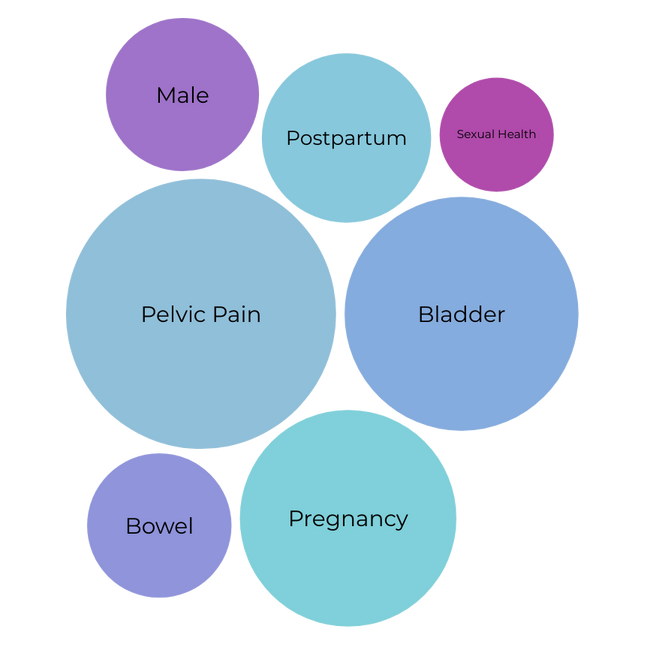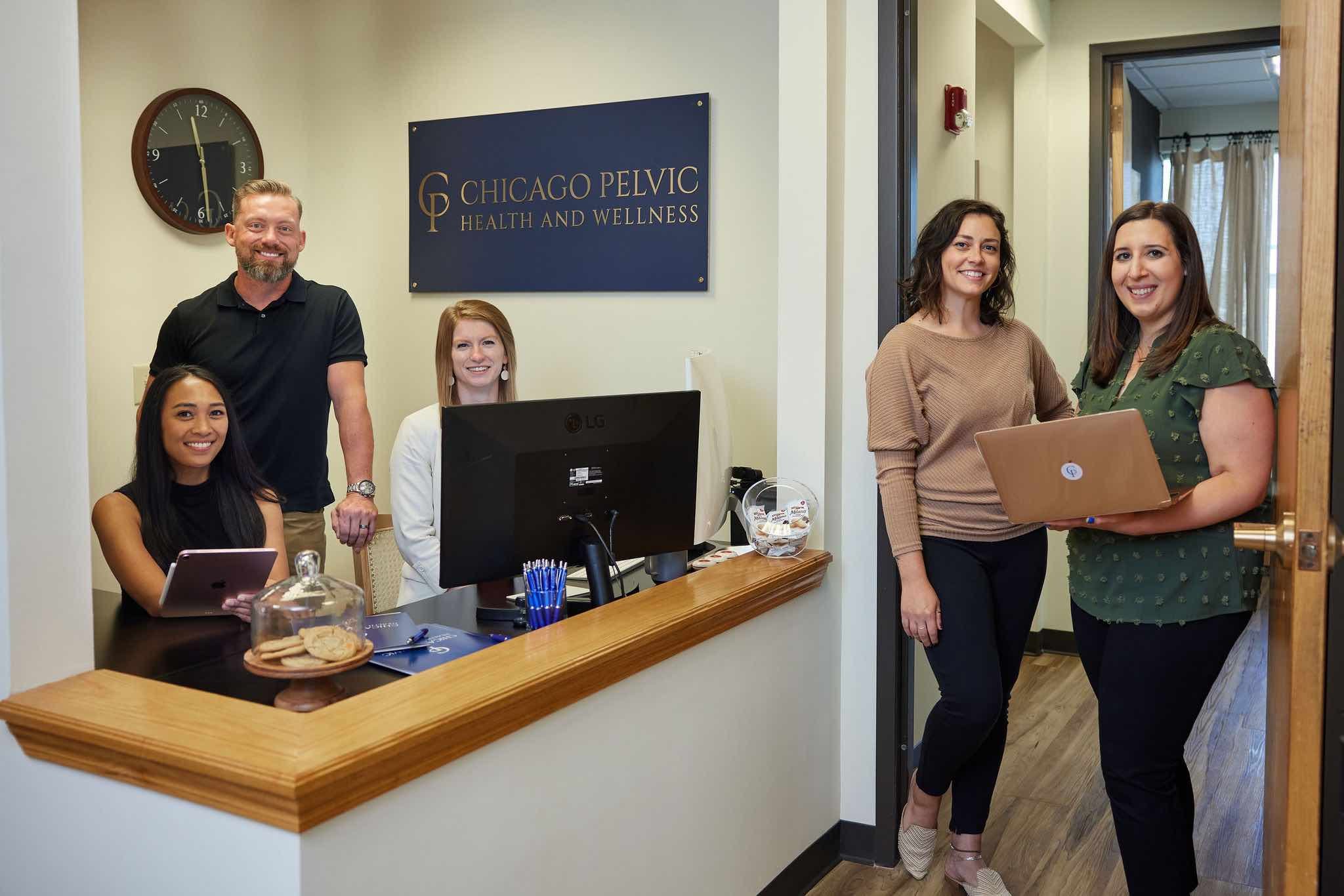
Pelvic Floor PT Experts in Wheaton, IL
Specialized Care for Lasting Relief
Welcome to CPHW, your premier destination for expert pelvic floor physical therapy in Wheaton and the Western Chicago Suburbs. Our Board-Certified Doctors of Physical Therapy are dedicated to providing specialized and one-on-one care for a wide range of health conditions for men and women, from pregnancy and postpartum recovery, incontinence, pelvic pain, prolapse, bowel issues, and much more. Let us help you regain control of your pelvic health and improve your overall wellness.
Percentage of Male and Female Patients being seen for Pelvic PT at CPHW
The Average Age of our Patients being treated for Pelvic Floor Dysfunction
The Most Common Pelvic Floor Concerns Treated in our Wheaton Office
Expert Pelvic Floor PT (PFPT) for Men and Women of all ages:
PFPT is a specialized physical therapy focused on diagnosing and treating conditions related to the pelvic floor muscles. This includes personalized treatment plans and exercises designed to address issues related to your pelvic floor area. The goal is to improve the strength, flexibility, and function of the pelvic floor, leading to better overall health and quality of life. At CPHW, our expert pelvic floor PT is delivered by Board-Certified Doctors of Physical Therapy who are dedicated to providing the highest level of care.
We offer specialized care for:
Bladder Issues: Treating bladder frequency or urgency, urinary leakage/incontinence, bladder pain, difficulty starting or stopping, trouble emptying bladder, nocturia
Bowel Issues: Treating fecal leakage/incontinence, constipation, inability to control gas, bowel irregularities, irritable bowel syndrome, fecal urgency, incomplete evacuation, rectal prolapse
Pelvic Pain: Treating interstitial cystitis, genital pain, tailbone pain, groin & hip pain, pain with sex or exams, pelvic congestion, endometriosis, vulvodynia, vaginismus, pudendal neuralgia
Pregnancy & Postpartum: Treating pelvic girdle pain, pregnancy related pain, diastasis recti, returning to exercise, pelvic organ prolapse, low back/SI joint pain, birth preparation, scar adhesion, and Cesarean section (C-Section)
Male Pelvic Concerns: Addressing male pelvic pain, chronic prostatitis, pre- and post-operative care for prostatectomy, pain with sex, hip/lower back pain, groin pain, tailbone pain, and male diastasis recti
Sexual Health: Erectile dysfunction, premature ejaculation, difficulty with orgasm, pain or leakage associated with sex, pain with penetration, arousal disorders, menopause health, sexual assault care
Our mission at CPHW is to bring awareness to the challenging and complex pelvic health issues women and men face through our individualized care plans in our empathetic environment. We pride ourselves on delivering superior pelvic floor care with the utmost respect and professionalism. We are committed to empowering our patients to get back to the life they have been waiting to enjoy!
What makes Pelvic Floor Physical Therapy different at CPHW
One on One Care
60 minute Physical Therapy sessions with your Doctor's dedicated attention in a private room for treatment with a pillow-top medical bed, soft pillows, and real sheets in a beautiful space.
Board Certified Pelvic Health Experts
Our exclusive focus on pelvic floor conditions and disorders sets us apart. All of our therapists are board-certified in Pelvic Rehabilitation and Therapy, ensuring the highest level of expertise and care.
Individualized Treatment Plans
We avoid cookie-cutter exercises. Instead, we create tailored treatment plans that address your unique health concerns and goals, whether it's returning to exercise, reducing lower back pain, improving menopause health, or other objectives.
Holistic Approach
We understand the importance of how your pelvic floor relates to the rest of your body, both physically and mentally. Our holistic approach ensures comprehensive care that considers all aspects of your well-being.
Safe and Inviting Environment
Our Wheaton, IL pelvic pt clinic is designed to provide a positive patient experience, free from cold medical offices, stirrup beds, or open gym spaces with other people working out. We prioritize your comfort and privacy.
Leave with hope
At Chicago Pelvic, you will have your questions answered and leave with a clear plan of healthy actions to take for your health. We aim to empower you with the knowledge and support needed for your journey to wellness.
CPHW is your go to medical center for pelvic health and wellness

Partnerships and Acknowledgments
We would like to thank the following local and national institutions that have helped build the pelvic health community and helped us become experts in Pelvic Floor Physical Therapy!
Board Certified Pelvic Health Specialist
Chicago Pelvic’s team of Doctors have been certified by multiple organizations, ensuring the highest level of expert Pelvic Floor medical care.
-
A DPT is a "Doctor of Physical Therapy." They are a healthcare professional who has completed a doctoral-level program in physical therapy and is licensed to practice physical therapy.
Pelvic Floor Physical Therapist are the true experts in musculoskeletal system.
DPT programs typically take three to four years to complete and include coursework in anatomy, physiology, pharmacology, kinesiology, exercise prescription, and other related topics. Students also gain clinical experience through internships and other practical training opportunities.
After completing a DPT program, graduates must pass a licensing exam to become a licensed Physical Therapist (PT).
-
WCS stands for "Women's Clinical Specialist." It is a board certification program offered by the American Board of Physical Therapy Specialties (ABPTS) that focuses on advanced knowledge and expertise in the physical therapy management of pelvic health conditions.
Physical therapists who obtain the WCS certification have completed advanced training in the evaluation and treatment of a range of health conditions, such as pelvic pain, urinary incontinence, pelvic organ prolapse, pregnancy and postpartum musculoskeletal conditions, and breast cancer-related rehabilitation.
The certification process includes a rigorous examination and demonstration of advanced clinical skills and knowledge, as well as ongoing continuing education requirements to maintain the certification. PTs with a WCS certification can provide specialized care to people throughout their lifespan, improving their quality of life and overall health.
-
PRPC stands for "Pelvic Rehabilitation Practitioner Certification." It is a certification program offered by the Herman & Wallace Pelvic Rehabilitation Institute that focuses on advanced training in the evaluation and treatment of pelvic floor dysfunction.
Physical therapists who obtain the PRPC certification have completed advanced training in the management of a range of pelvic floor conditions, such as urinary incontinence, pelvic organ prolapse, chronic pelvic pain, and sexual dysfunction. They have also demonstrated advanced clinical skills in pelvic floor muscle assessment, manual therapy techniques, and exercise prescription for pelvic floor rehabilitation.
The certification process includes completion of several courses offered by the Herman & Wallace Pelvic Rehabilitation Institute, as well as a comprehensive examination and demonstration of advanced clinical skills and knowledge. PTs with a PRPC certification can provide specialized care for patients with pelvic floor dysfunction, helping to improve their quality of life and overall health.
-
The PCES certification equips Physical Therapists with advanced techniques and exercises for pelvic health, going beyond traditional methods to improve alignment, strength, and address the root causes of pelvic floor issues from pregnancy. It offers a comprehensive approach, integrating a variety of perspectives and personalized adjustments to ensure effective treatment plans for individuals at any fitness level before, during, or after pregnancy.
-
Trauma-informed pelvic floor physical therapy is an approach to treating pelvic floor dysfunction that takes into account the impact of trauma on the body and the mind. This type of physical therapy recognizes that many people with pelvic floor dysfunction may have experienced trauma, whether physical, sexual, or emotional, that can affect their symptoms and their ability to receive treatment. At Chicago Pelvic, we prioritize employing a trauma-informed approach and have collaborated with mental health trauma experts to educate our team on optimal care practices.
These problems can include urinary and fecal incontinence, pain during intercourse, chronic pelvic pain, and other related issues.
Trauma-informed pelvic floor physical therapy focuses on creating a safe and supportive environment for patients, recognizing the potential impact of trauma on their symptoms and treatment, and using a variety of techniques to help patients manage their symptoms and improve their quality of life.
Some of the key principles of trauma-informed pelvic floor physical therapy include:
We have created a safe and supportive environment for our patients, we treat our patients in a private treatment room, also allowing patients to bring a support person with them to appointments, and using language that is respectful and non-judgmental.
Recognizing the potential impact of trauma on patients' symptoms and treatment, and working with patients to develop a treatment plan that takes their unique needs and experiences into account.
Using a variety of techniques to help patients manage their symptoms and improve their quality of life, including manual therapy, exercises, relaxation techniques, and other approaches as appropriate.
Encouraging patients to play an active role in their own care, and providing them with education and resources to help them better understand their condition and the treatments that are available.
Overall, trauma-informed pelvic floor physical therapy is an approach that recognizes the complex interplay between physical and emotional health, and seeks to provide patients with the tools and support they need to manage their symptoms and improve their quality of life.
-
CIDN stands for "Certified Integrated Dry Needling." It is a certification program offered by the Integrative Dry Needling Institute that provides advanced training for physical therapists in the use of dry needling as a treatment technique.
Dry needling involves the insertion of a thin needle into trigger points, or areas of muscle tightness and pain, in order to release tension and promote healing. PTs with a CIDN certification have completed advanced training in the use of dry needling for musculoskeletal conditions, such as neck pain, back pain, shoulder pain, and knee pain.
The certification process includes completion of several courses offered by the Integrative Dry Needling Institute, as well as a comprehensive examination and demonstration of advanced clinical skills and knowledge. PTs with a CIDN certification can use dry needling as part of a comprehensive treatment plan for patients with musculoskeletal conditions, helping to reduce pain and improve function.
-
The physical therapy Cert. DN refers to "Dry Needling." Dry needling is a treatment technique that is used by some physical therapists to address pain and muscle dysfunction. It involves inserting a thin needle into specific points in the muscle, with the goal of releasing tension, improving blood flow, and reducing pain.
Dry needling is based on the principles of traditional acupuncture, but differs in several key ways. While acupuncture is a traditional Chinese medicine practice that involves the use of needles to stimulate energy flow along specific pathways in the body, dry needling is a Western-based approach that targets trigger points in the muscle.
In order to practice dry needling, physical therapists must undergo specialized training and certification. The certification DN indicates that a physical therapist has completed the necessary training and met the requirements for certification in dry needling.
It's worth noting that not all physical therapists are trained in or certified to perform dry needling. If you're interested in this type of treatment, it's important to find a physical therapist who has the appropriate training and experience.
Debunking Pelvic Health Myths
Sexual Discomfort:
It's a common myth that mild pain during sex is normal. This misconception often leads to ignoring underlying conditions like dyspareunia, pelvic floor dysfunction, or vaginismus. Advice such as "just relax" or "use more lubricant" can be inadequate, overlooking the need for a comprehensive evaluation and tailored treatment. Proper diagnosis and personalized therapy are crucial for addressing these issues effectively.
Internal Pelvic Evaluation:
There is a misconception that internal pelvic evaluations or treatments are unnecessary. In reality, these assessments are vital for understanding the health of the pelvic floor muscles. They provide critical insights that aid in accurate diagnoses and the development of effective treatment plans. Skipping these evaluations can lead to missed or misdiagnosed conditions.
Postpartum Leaks:
Many people believe that leaking after childbirth, especially during activities like sneezing or jumping, is just a "new parent phase." However, stress urinary incontinence is a common issue that can be effectively managed with pelvic floor rehabilitation. This approach offers strategies for recovery and strengthening, helping new parents regain control over their bladder function.
Psychological Concerns:
Sexual health issues are often dismissed as "all in your head," which neglects the complex interplay between mental and physical health. It's essential to recognize psychosomatic symptoms and address both psychological and physiological factors for holistic treatment. Understanding and treating the mind-body connection can significantly improve sexual health and overall well-being.
Pregnancy Pains:
Pain during pregnancy is frequently normalized as "part of the process." This overlooks conditions like pelvic girdle pain or symphysis pubis dysfunction, which can cause significant discomfort. Comprehensive prenatal care and targeted interventions can alleviate these pains, enhancing well-being during pregnancy. Proper care can make a substantial difference in a pregnant person's quality of life.
General PT vs. Specialized Pelvic PT:
A common misconception is that general physical therapy clinics can provide the same level of care as specialized pelvic health physiotherapy. Pelvic health issues demand a multidisciplinary approach, encompassing specialized assessments and treatments not typically offered in general PT. Specialized pelvic PT clinics have the expertise and tools necessary to address the unique challenges of pelvic health effectively.
By debunking these myths and providing accurate information, we aim to empower individuals to seek the appropriate care for their pelvic health needs. Comprehensive evaluations and tailored treatments are key to addressing pelvic floor dysfunctions effectively.
By incorporating this understanding and debunking prevalent myths, we aim to enhance awareness and understanding of pelvic health, emphasizing the importance of specialized care and comprehensive approaches to treatment.


























Chicago Pelvic Health’s Squatty Potty campaign helps local residents improve bowel health with proper toilet posture. Find out how this simple stool can transform public restroom experiences for better pooping.